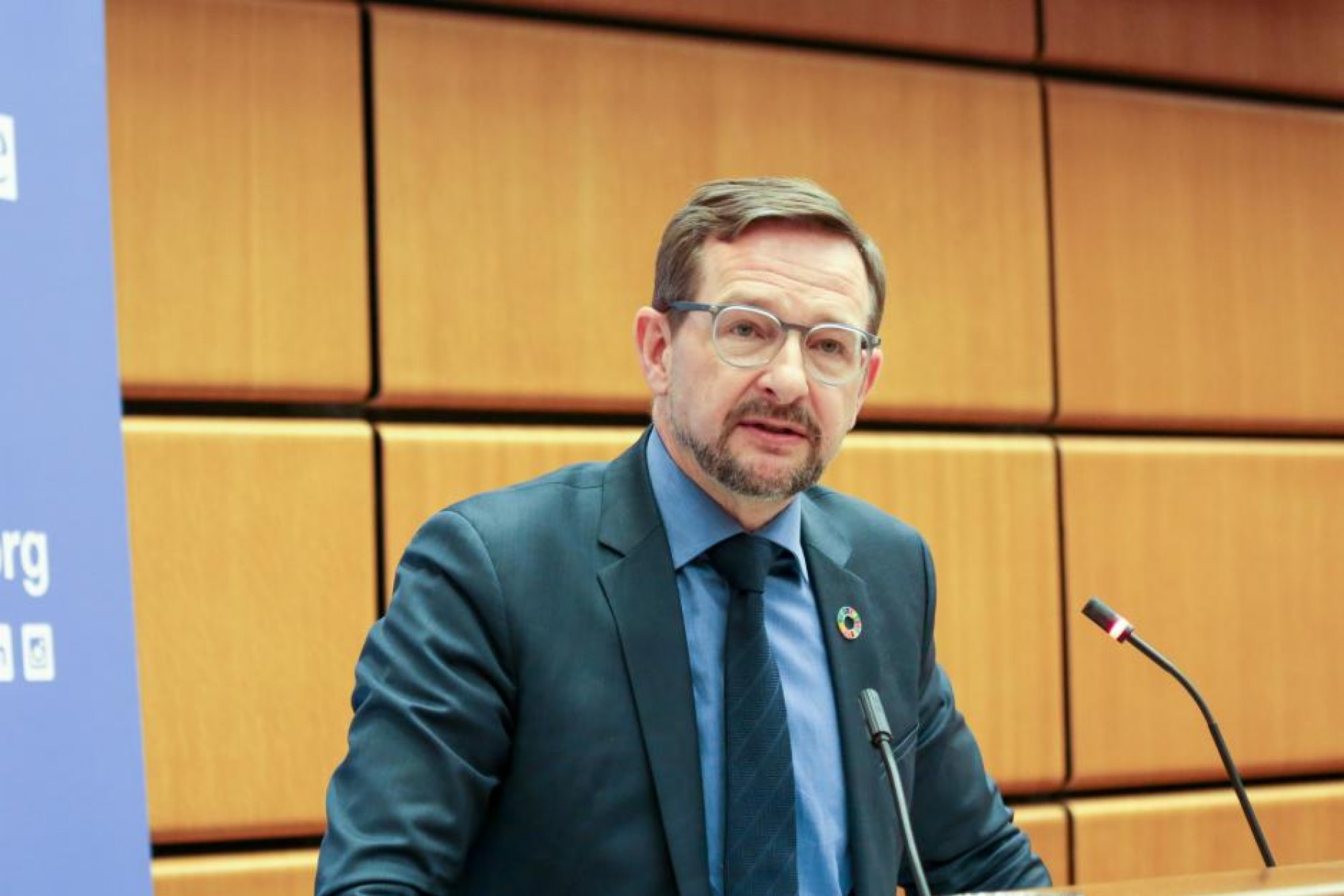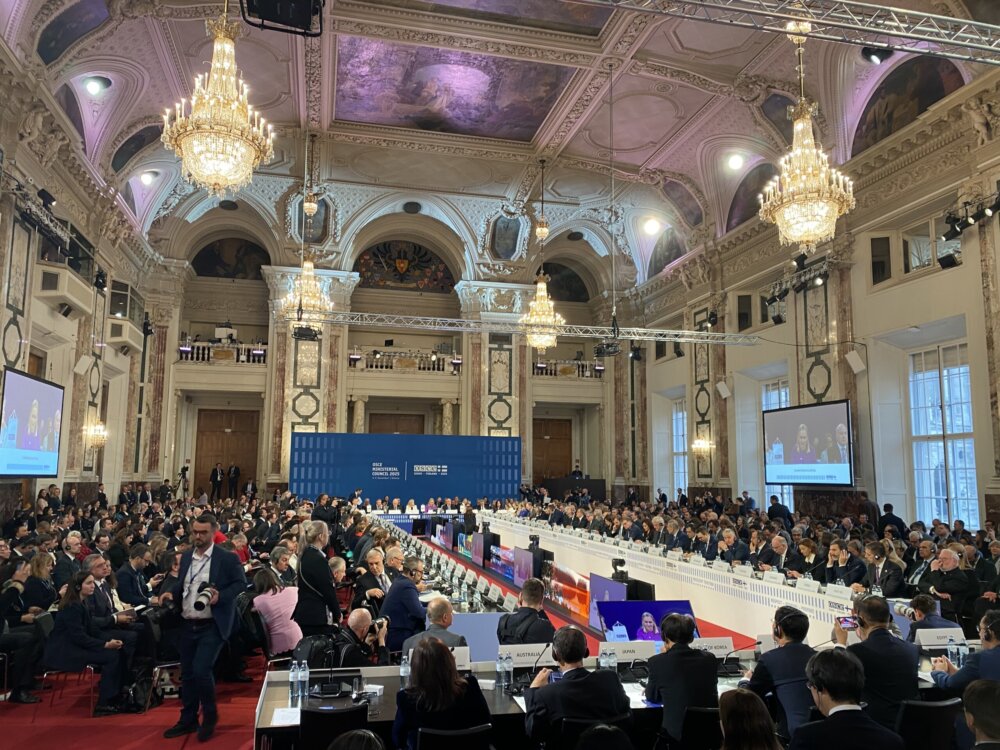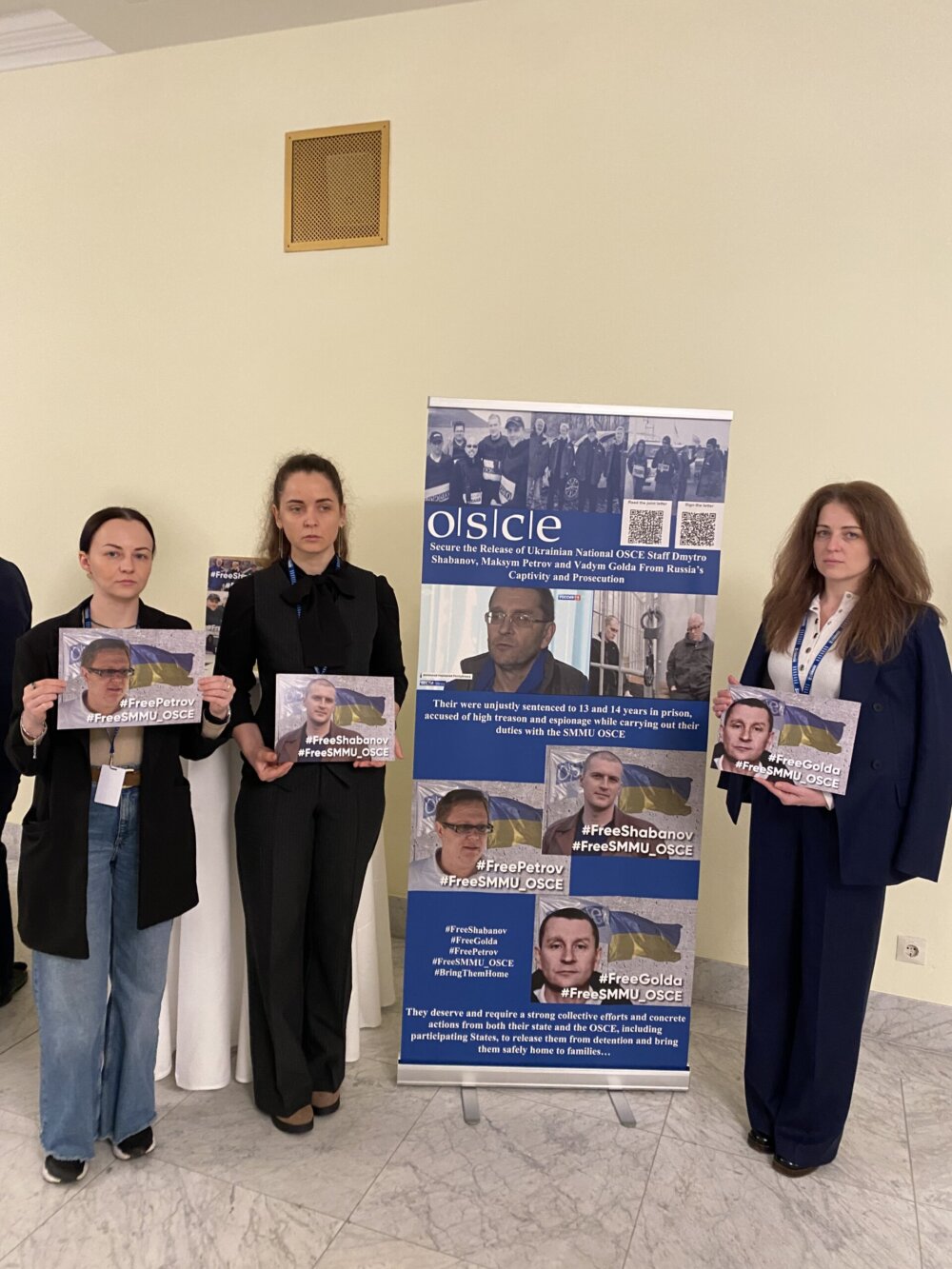OSCE

‘Stop micromanaging the Secretary General’ Thomas Greminger on his past three years in office
Ambassador Thomas Greminger had to leave the post of OSCE Secretary General in July 2020 after OSCE participating States failed to agree on extending his job as well as those of the three OSCE heads of institutions. In this interview, he talks about his lessons learned as well as his successes and failures during his time in office. He also makes a strong appeal to OSCE participating States to make better use of the OSCE and to stop micromanaging the Secretary General.
SHR Monitor: Ambassador Greminger, how do you feel after you had to leave your post as OSCE Secretary General abruptly in July last year?
Thomas Greminger: Initially I was obviously quite disappointed given the circumstances of not being granted a second term of office. Meanwhile I am pleased to see that the OSCE’s leadership crisis was of limited duration and an able leadership team has been appointed. Personally, I have come to appreciate the unique professional experience I was able to gain during my three-year term. I am also quite proud of what I managed to achieve in helping to steer the OSCE ship through troubled waters. Now I am looking forward to taking up my next assignment as Director of the Geneva Centre for Security Policy (GCSP).
During your three years in office, you launched a management reform process in the OSCE Secretariat in Vienna. Do you consider it a success or a failure? Which reforms were you able to implement? Are there any reform plans that you were unable to finalize because of your early departure?
I think that I was able to prove that the OSCE is actually capable of reform. We made a lot of progress in modernizing and in speeding up management processes. Significant steps have been taken to increase the efficiency and effectiveness of the OSCE and I think that’s very encouraging.
At the same time, however, essential reforms were stymied early on or have yet to cross the finish line. For instance, when it comes to reforming the OSCE budget process, I was less successful. My goal was to move from an annual budget cycle to a biennial cycle and, through an extended programme outline, devise a longer planning horizon of around four to five years, similar to other international organizations such as the International Atomic Energy Agency (IAEA). Unfortunately, this suggestion was blocked by just one State for completely unrelated reasons, something that happens unfortunately too frequently in the OSCE.
I also drove forward the idea of so-called shared service centres in order to save the Organization scarce resources. The idea behind this concept is to concentrate services in one administrative unit and, where appropriate, relocate them to more cost-effective countries. For example, the OSCE’s IT support is already almost entirely managed from Sarajevo, Bosnia and Herzegovina.
I would also have liked to reform some of the OSCE’s human resource policies. In my view, it is necessary to prolong the periods of service for directors. Currently they have to leave after just four years and cannot be extended. If they had a chance to stay in their posts a bit longer, the OSCE would be able to save a lot of money and improve its institutional memory.
The same applies to the 10-year limit for professional staff in the OSCE. I think it would make sense, especially for younger professionals, if they had a chance to come back to the OSCE after a break of a few years. This would greatly enhance continuity.
One reason for the slow pace of reform is the fact that the OSCE’s Advisory Committee on Management and Finance is busy for most of the year with negotiating and approving the annual OSCE budget. The timeframe for discussing and approving substantial reforms is therefore incredibly limited. This is another strong argument to move to a biennial budget cycle with just one substantive budget debate every two years.
This already leads me to another important question. Were you happy with the scope of the mandate of the OSCE Secretary General? Or do you feel that you were too constrained in your room for manoeuvre?
As you know, the Secretary General’s mandate encompasses a management role as well as a political role. In my view, it is of utmost importance that the management role, also defined as Chief Administrative Officer, is granted in full to the Secretary General. I would like to make an appeal to OSCE participating States: Stop micromanaging the Secretary General!
When it comes to the political role, I have a very pragmatic answer for you. I think this role depends a lot on who is in the post of the (yearly-rotating) Chair-in-Office (CiO). There are some Foreign Ministers who devote a lot of time to the OSCE, they travel the entire OSCE region and attend every OSCE conference. Other Foreign Ministers have less time or are more focused on issues of more domestic relevance.
It is therefore very important that the Secretary General (SG) and CiO discuss their availabilities and priorities at the beginning and in the course of the year and devise a clear division of labour. In cases where the CiO has less time, the SG may thus assume a more active political role. In other cases, the SG will be less visible on the political front.
Looking back on those three years, is there anything that you could criticise yourself for?
I think that in some cases I may have communicated not enough. One of my main lessons learned is the need for a lot of dialogue with OSCE Ambassadors in Vienna. At the beginning of my time in office, my main focus was on inviting all 57 Ambassadors regularly to informal meetings called “The SG’s Hour”. But such meetings tend to turn very quickly into a type of “hearing” and it becomes very difficult to create an atmosphere conducive to genuine dialogue.
Beyond my bi-weekly meetings with the EU, the American and the Russian Ambassadors, I therefore developed another format with small groups of Ambassadors that allowed to create a more relaxed atmosphere and more substantive exchanges. But then COVID-19 hit us all, and all personal meetings were cancelled. In any case, in retrospect, I would seek dialogue much more intensely, even if there are no specific concerns or objectives.
Speaking about communication, why do you think that the OSCE is so little known in the general public? Do you think that the communication policy should be reformed?
Although the number of staff in the communications department of the Secretariat (13 posts) has remained practically unchanged for twenty years, the OSCE has managed to achieve considerable media visibility. Skilful use of social media contributes significantly to this. “Social media mainstreaming” is therefore undoubtedly a success factor and the potential has not yet been exhausted.
It was important to me to integrate the question of communication and messaging into all strategy and political processes from the start. The communicative training both at the head office and in the executive structures places a lot of emphasis on storytelling. It is about the ability to tell success stories in the context of extra-budgetary projects or “human impact stories” from the field. The systematic use of trips by the Secretary General for media messaging has also proven successful.
In addition to the insufficient human and financial resources for a contemporary communication policy, the OSCE still lacks modern branding. The OSCE would indeed offer enough content for an impressive brand: the OSCE as a guarantor of peace and security in the Euro-Atlantic and Euro-Asian area, as an indispensable actor in conflict prevention, as an implementer of the UN’s Sustainable Development Goals, or as an advisor for addressing modern security challenges.
Does this mean that the decision of the Permanent Council from 2002 on which the communication work of the organization is based has to be revised? Its revision would definitely make the task easier, as it is very restrictive. A strong political will on the part of the Chairpersonship and Troika for a modern communication policy would also expand the scope for a modern communication policy.
I would now like to move away from the management aspects of your past job and take a look at the broader political level. You know the OSCE very well, not only because you served as OSCE Secretary General for three years, but also because you worked as Switzerland’s Ambassador to the OSCE for five years. Where do you see the main strengths and advantages of the OSCE? Or to phrase it differently: Why should ordinarily citizens in Switzerland or Austria or elsewhere in the OSCE region care about the Organization?
I think one of the OSCE’s main comparative advantages is its ability to manage conflicts and prevent them from escalating. In this sense, the OSCE is vital for maintaining peace and security everywhere in the OSCE region.
In addition, by providing advice and support, the OSCE is also able to strengthen national institutions and make states more resilient. For example, the OSCE’s election monitoring activities are very well known and the expert support provided by ODIHR often leads to an improvement of election legislation and thereby enhances democratic institutions.
Furthermore, combating violent extremism is one aspect that the OSCE has been tackling in the past few years. In cooperation with NGOs and governmental institutions, OSCE field operations made a difference in many regions, such as in Eastern Europe, Central Asia and the Western Balkans.
If the OSCE had more money at its disposal, it would be better able to exploit its full potential. Compared to the EU or NATO, the OSCE is “the poor man’s organization”. Think about the fact that for nine years the OSCE’s budget has been constraint by so-called “zero nominal growth“. In real terms, this means that the Organization lost about 20% of its budget in the past nine years.
Let me now turn to the difficult relations between the West and Russia that manifest themselves in the OSCE more than in other organizations. How can those strained relations be improved? There is now talk that another political process should be launched, similar to previous processes, such as the Corfu process or Helsinki+40 process. Those past processes all ended in deadlock. What is your view? What can be done in the context of the OSCE?
I think the previous political processes that you are referring to were hampered partly by political developments (conflicts in Georgia, Ukraine) and partly because they were exclusively bottom-up-driven processes. They had a diplomatic logic but not enough political clout. What is needed instead, is clear leadership and support by the political level such as Foreign Ministers or Heads of States.
Furthermore, I think it would be wise to devise such a new process in small steps and not to expect a solution of the big political questions from the outset. First, let us for instance agree on strengthening the OSCE as an institution, even if there are fundamentally divergent views about the Euro-Atlantic and Eurasian security. This could possibly contribute to a positive dynamic.
The OSCE as a platform for inclusive dialogue and joint action could thus better help States identify areas of common interest and offer them opportunities to cooperate. For example, the United States and Belarus, arguably two States who do not have a lot in common, last year worked together on a Ministerial decision on combating trafficking in human beings. So, you see, these areas of convergence do exist.
For example, take the topic of military risk reduction. I would say that pretty much all States agree that this is an important topic that needs to be addressed. What we now need is a group of States, supported by their leaderships on the ministerial level, that agree to use the platform of the OSCE Structured Dialogue to address this issue in a constructive and result-oriented way.
In this context, I hope that the new Biden Administration in Washington will recognize the potential of the OSCE and make good use of it.
Once a positive dynamic is created, I believe a second step could be taken: States could attempt to credibly recommit to the 1975 Helsinki Principles by trying to thrash out the dilemmas (for example territorial integrity vs. self-determination) and by agreeing on how they should be interpreted in 2025, when we celebrate the 50th anniversary of the Helsinki Final Act, the OSCE’s founding document.
I believe in a sequenced approach, but clearly, the OSCE would greatly benefit from stronger engagement by Foreign Ministers. If a group of committed Foreign Ministers were to work on solving some of the Organization’s long-standing institutional problems, such as the budget process, the scales of contribution or the access of civil society organizations to human dimension events, everyone would benefit from it. Currently, Chairpersonships are too busy just to keep the shop running, and therefore they do not have time or energy to seriously address the fundamental problems.
Finally, do you have any further advice to your successor, Helga Schmid?
I had a good opportunity to share my insights with her. I think the OSCE should consider itself lucky to have such an outstanding diplomat and leader as Secretary General. After these uncertain times, it is now important that she gives plenty of moral support to her directors and to all OSCE staff.
And to current and future Chairpersonships as well as to all participating States: Make full use of the OSCE as diplomatic space and political platform. And be smart and use the support provided by the OSCE Secretariat.



Comments
* Your email address will not be published